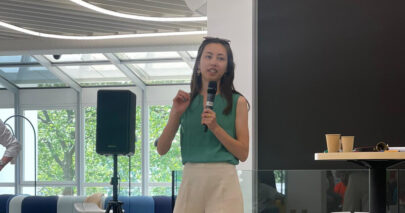
Hoon Ping Ngien is no stranger to the ins and outs of government organizations.
He has served as Deputy Secretary of Singapore’s Ministry of Finance, and spent close to two decades in the Ministry of Defence, serving in various leadership appointments, including as Director of Joint Operations overseeing all operations; as well as Chief of Logistics, overseeing supply chain, transport and engineering projects. Ngien’s expertise in electrical engineering served him particularly well at the Singapore Land Transport Authority (LTA), where he sat on the board of directors.
It served him so well, in fact, that in 2016, he received an offer to take on the CEO position at LTA.
When mandates change, so must leaders
LTA leads the planning and development of the metro, roads and pathways in Singapore. In 2017 the organization’s mandate expanded, and it took on the ownership of train and bus assets, and the oversight of their operations too. As the authority of one of the most highly rated public transport systems in the world, Ngien must continuously strive for excellence. This includes pushing the boundaries of technology on innovative systems such as autonomous transport.
The LTA also – in a marked change from how it operated in the past – claims both regulatory and operational responsibility.
While Ngien’s academic studies had prepared him for the technical know-how he needed – the electrical engineer earned degrees at the UK’s University of Manchester and a master’s in systems engineering at the National University of Singapore – the Singapore Public Service Division offered him the chance to attend a short educational program before taking up the position. Ngien actively searched out a program that could provide him the leadership skills and finely tuned mindset he would need.
He found the compact but intensive learning journey he was searching for with the Breakthrough Program for Senior Executives (BPSE) program at IMD. Surrounded by a group of senior executives and business leaders across different industries, Ngien spent 10 days immersed in courses focusing on how to uncover the breakthrough insights needed tackle the most critical and difficult-to-solve issues that limited his organization.
“I was due to take over LTA during a time of intense change at the organization,” said Ngien. “I needed to prepare a change management roadmap in advance so I would be ready to make transformation happen from day one.”
Setting the right priorities
LTA was in the midst of a complicated transition when Ngien took the reins.
“We had a year and a half of serious problems with the metro, so I knew I needed to give that area my full attention,” said Ngien. “My teammates helped shoulder responsibilities for other domains like buses and taxis so I could focus on the metro.”
The start of his new role was challenging. In 2017, his first year, there were two major incidents and Ngien even questioned what he had gotten himself into, he said.
Heavy rains and a poorly-maintained sump pump had caused water to overflow and flood a section of metro tunnel.
“This first incident stopped trains for more than 24 hours, causing severe disruption,” said Ngien. “But the second had repercussions beyond just inconvenience.”
Later that same year, Ngien was managing a re-signaling project for the metro. Its highly complex nature and technical requirements led to an error which caused an accident. At the time, he was on a flight to Paris to meet with Original Equipment Manufacturers (OEM) and learned of the collision just after his flight touched down. He did not even leave the airport, and immediately boarded a flight back home to Singapore.
Yet Ngien didn’t blink in the face of disruption. His dedication coupled with the lessons learned at BPSE was the primary driver in his ambitious plan for organizational improvement.
The case study that stuck
In the past three years plus since Ngien has served as LTA’s CEO, it has seen remarkable change. The secret to this success came from applying the lessons he learned at BPSE directly, he said.
The BPSE program features several case studies from which participants can draw parallels to their own challenges. For Ngien, Professor Shlomo Ben-Hur’s lessons on René Obermann, CEO of Deutsche Telekom were life changing.
“Turning around Deutsche Telekom meant contact time spent with people on the ground,” recounted Ngien. “Obermann was candid and open, and brought in a team that could really deliver – and not just propagate office politics.”
Channeling these qualities, Ngien put treating colleagues well first. He listened to their points of view, accepted their beliefs and kept a constant flow of communication.
“Simple messages work well,” said Ngien. “My goal was that we would support one another and for all to feel empowered.”
One of Ngien’s main goals was to remove misunderstandings and misgivings between the regulator and transport operator branches. This is something he learned from his fellow participants at BPSE –upon whose deep management knowledge he was able to draw.
“Listening is key in change management,” said Ngien. “It’s important to listen carefully before, during and after the process. Next, use an easily understood message that states what is important and what must be done.”
The sacrificial leader
He rallied the team around a new company philosophy, “SBC” – safer, better and more cost-effective.
“As the metro wasn’t functioning well, the group suggested that the first step was to build a trusting community that was united across all fronts,” said Ngien. “I learned that I should use influencing rather than commanding, and not engage in any adversarial working relationship.”
Determined to win over the trust of his employees, Ngien sacrificed some of the traditional perks of the job. He also made deliberate efforts to walk the ground with his people and step into their shoes. On most festive holidays, he would be visiting frontline officers and operations centres, often bringing snacks to share some of the festive cheer.
“The point is that I had to work harder than my employees to earn their respect,” said Ngien. “I couldn’t just sit in the office and give instructions.”
So Ngien traveled frequently to tunnels and construction sites, spending these late nights building up his team relationships. Eventually, the other leaders at LTA and the public transport operators started to follow suit, he said.
“Real leaders know it’s not about self-gratification…it’s not about you, it’s about the people you lead,” said Ngien. “This was not a one-man show!”
He fostered an open corporate culture and encouraged staff to share bad news to avoid coverups and deal with problems rather than bury them. This meant staff had permission to try and fail as well and added to the robustness of discussions.
“I had to become aware of my own biases, so I could properly frame the issues that mattered,” said Ngien. “This allowed everyone to speak their minds and I learned our diverse staff had great expertise in many different areas.”
People before politics
Devoting more than 50% of his time to solving the metro problems was just the sort of deep focus needed – by mid-2018 LTA began to see progress as fewer breakdowns and accidents occurred. By empowering others on his team, he could focus on the areas that needed the most attention.
“I put another important BPSE maxim – ‘Not making a decision is worse than making the wrong decision’ – here,” Ngien explained, convinced that keeping fluid is key to avoiding “paralysis by analysis”.
By late last year, Ngien’s dedication, decision-making and change management techniques had paid off. His team was well-grounded and well-integrated, making the work itself – not office politics – its emphasis. As a result, LTA’s reputation soared as it deftly navigated its new operational and regulatory mandate.
“We were able to achieve 1.6 million mean kilometers between failures, or MKBF,” Ngien smiled. MKBF is used as a measure of rail reliability, as it charts the distance in which a train can clock before a fault of more than five minutes occur.
Given his leadership philosophy, it’s no surprise that the humble CEO puts all credit in the hands of LTA employees – and that he has become the leader he set out to be.
Mr. Ngien will be handing over his role as CE LTA on 1 Sep 2020. Mr Ngien will then serve as CEO of a new Supply Chain unit of Singapore’s Fairprice Group to strengthen the supply chain capabilities of Singapore, especially in food supply chain


